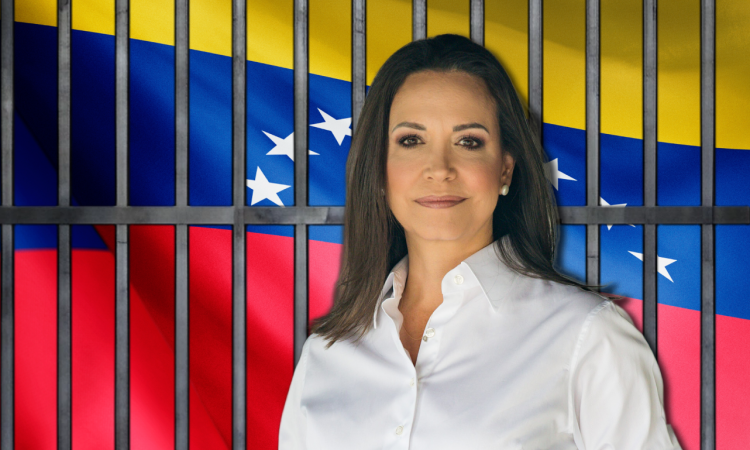On June 27, 2023, Antonio Meneses of the Venezuelan Comptroller’s Office (CGR) said María Corina Machado’s ban on public office was extended from 12 months to 15 years. Just four days prior, Machado—leader of the Vente Venezuela party—announced her candidacy for the primary election that the Venezuelan opposition will hold on October 22.
Machado—the preferred opposition candidate, according to pollsters—seeks to run in the presidential race against dictator Nicolás Maduro in 2024. Afraid of losing power, the regime is trying to avoid her participation with tactics that mock due process of law.
Under the argument that Machado’s sworn assets statement (required as a congresswoman) had errors, the Maduro dictatorship in 2015 banned her from occupying public-sector positions for 12 months. She appealed but was rejected by the Supreme Court of Justice.
Meneses has argued that Machado’s penalty extension is due to her alleged participation in a corruption scheme during Juan Guaidó’s interim government. Venezuelan officials, however, have failed to provide details on how Machado allegedly engaged in corruption.
A Foundation of Sand
The dictatorship is desperate to block Machado’s participation in the 2024 election since her popularity could disrupt the status quo. Maduro has also claimed there will only be an election if other countries remove all sanctions against Venezuela. In other words, the Chavista mob will cling to power with or without elections.
Una INÚTIL “inhabilitación” que sólo demuestra que el régimen sabe que YA está DERROTADO.
Ahora votaremos con más fuerza, más rebeldía y más ganas en las Primarias.
Aquí quién HABILITA es el pueblo de Venezuela.
Hasta el final es HASTA EL FINAL! pic.twitter.com/wRof639noG
— María Corina Machado (@MariaCorinaYA) June 30, 2023
According to Central University of Venezuela Law Professor Allan Brewe-Carías, the extended ban on Machado is inconsistent and unconstitutional—not that the regime gives a damn about either:
- Article 49 of the Venezuelan Constitution requires the government to notify the sanctioned person. However, Machado did not receive any information regarding her ban extension.
- Meneses’s explanation regarding Machado’s ban is not a decision but an informative statement. Only the comptroller general can issue a ban, but the person who issued Machado’s ban remains unknown.
- Since the investigations by judicial institutions are classified, no public-sector worker can provide his insights regarding these. Meneses should be sanctioned for providing his opinion on this classified case, which is against the law.
- The regime unconstitutionally sanctioned Machado in 2015 for allegedly “not presenting a sworn statement about her patrimony.” The maximum period for such a sanction is 12 months, but regime officials have extended the ban to 15 years.
- Although Machado was never part of Guaidó’s interim administration, Meneses still said she was “participating in corruption schemes with Guaidó.” Such an allegation is not grounds for disqualification, according to the Law against Corruption.
After Brito made the CGR statement public on June 30, Uruguayan President Luis Lacalle Pou shared his support for Machado at a Mercosur summit. Further, on July 13 the European Parliament approved a resolution against the regime’s persecution of Machado:
“The parliament strongly condemns the Venezuelan regime’s arbitrary and unconstitutional decision to prevent prominent political opposition figures like María Corina Machado, Leopoldo López, Henrique Capriles, and Freddy Superlano from running in the 2024 elections, a ballot which could have constituted a turning point towards a return to democracy in the country.”
The independent National Commission for Primaries (CNP)—which is coordinating the opposition primary election—has also rejected the CGR ban on Machado. The CNP says the sanction will not stop Machado’s candidacy in the primary election.
If Machado wins the primary, however, the Venezuelan electoral authority (CNE) will likely block her candidacy by claiming she has a sanction against her.
COMUNICADO Comisión Nacional de Primaria rechaza inhabilitación de María Corina Machado pic.twitter.com/OvrSsNn0Ws
— Comisión Nacional de Primaria VE (@cnprimariave) July 1, 2023
Naked Electoral Fraud Has Begun
The dictatorship fears that Machado could gather enough support to threaten Maduro in 2024. That is why, in addition to lawfare, the regime has been physically attacking Machado during the 2023 electoral campaign.
For instance, on July 14 a group of regime sympathizers pelted Machado with objects at her rally in the Vargas province. Police officers were able to interject and protect Machado and her supporters.
Aggressions against Machado’s rallies are becoming more common. In the face of violence, though, Machado is continuing her electoral campaign under the motto: “This fight is not over yet.”
Maduro’s dictatorship is shamelessly trying to block his opponents’ electoral competition, especially Machado. This is similar to Daniel Ortega’s dictatorship in Nicaragua, which disqualified and jailed the opposition’s most prominent leaders.
We ought not be surprised. Both regimes are cut from the same cloth because they have taken over their countries’ institutions to stay in power. According to the World Justice Project’s Rule of Law Index, Nicaragua and Venezuela are ranked 133 and 140, respectively, out of 140 countries.
Maduro and his henchmen will not let go of power without a fight. Leaving office would imply an avalanche of judicial processes against them due to all the crimes they have perpetrated. Believing a tyrant will allow a peaceful and democratic transition is naïve.
This article reflects the views of the author and not necessarily the views of the Impunity Observer.
 Join us in our mission to foster positive relations between the United States and Latin America through independent journalism.
Join us in our mission to foster positive relations between the United States and Latin America through independent journalism.
As we improve our quality and deepen our coverage, we wish to make the Impunity Observer financially sustainable and reader-oriented. In return, we ask that you show your support in the form of subscriptions.
Non-subscribers can read up to six articles per month. Subscribe here.

